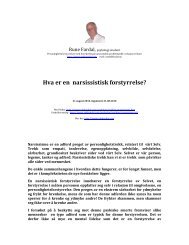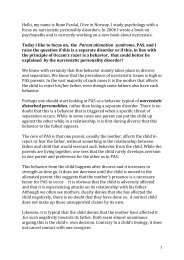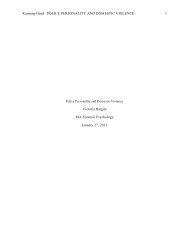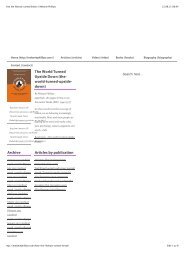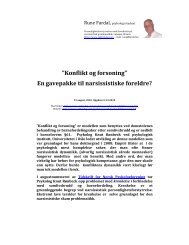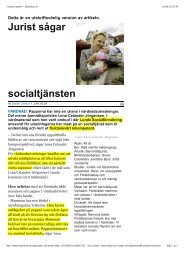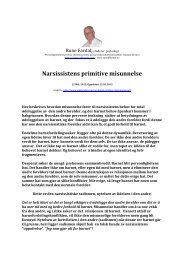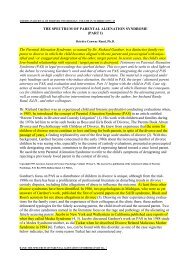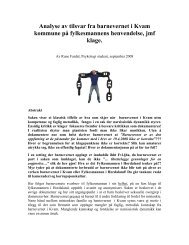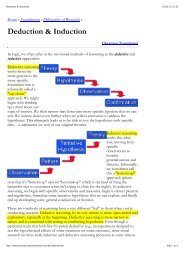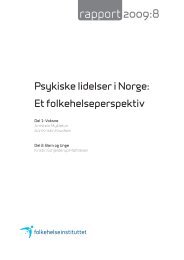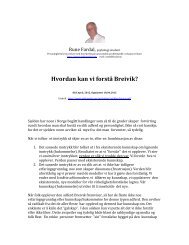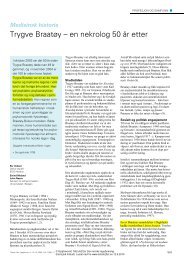The origins of narcissism and narcissistic personality disorder a
The origins of narcissism and narcissistic personality disorder a
The origins of narcissism and narcissistic personality disorder a
You also want an ePaper? Increase the reach of your titles
YUMPU automatically turns print PDFs into web optimized ePapers that Google loves.
THE ORIGINS OF NARCISSISM 69<br />
Under the weight <strong>of</strong> the current evidence, constructs like normal<br />
autism, normal symbiosis, primary <strong>narcissism</strong>, fusion, hallucinatory<br />
omnipotence, <strong>and</strong> other inaccurate depictions <strong>of</strong> infancy surely must<br />
give way. <strong>The</strong> theory <strong>of</strong> hallucinatory wish fulfillment, as Bleuler <strong>and</strong><br />
Vygotsky knew, seems especially implausible, if only because an organism<br />
that normally functioned in this manner would be incapable<br />
<strong>of</strong> survival. Indeed, it is difficult to imagine attributing to other species,<br />
as a piece <strong>of</strong> normal development, an infantile stage in which hallucination<br />
is a response to frustration. Equally telling is Stern’s (1985)<br />
argument that preverbal infants, much like nonhuman organisms, perceive<br />
the world literally <strong>and</strong> are, in the absence <strong>of</strong> gross pathology,<br />
incapable <strong>of</strong> distorting reality in a manner suggesting omnipotence <strong>of</strong><br />
thought; fantasies <strong>of</strong> omnipotence-for example, the use <strong>of</strong> a transitional<br />
object (Winnicott, 1953, 1971/1982)-require symbolic thought<br />
<strong>and</strong> language (Gramont, 1990). <strong>The</strong> role <strong>of</strong> symbolic <strong>and</strong> linguistic<br />
processes in constituting phenomena like omnipotence <strong>of</strong> thought <strong>and</strong><br />
transitional object usage suggests that, contrary to received ideas about<br />
infantile fantasies, <strong>narcissism</strong> has its <strong>origins</strong> in the second, not the first,<br />
year <strong>of</strong> life.<br />
As with any case <strong>of</strong> paradigm change, however, old notions do not<br />
just give way automatically, <strong>and</strong> the replacement <strong>of</strong> one set <strong>of</strong> ideas<br />
by another is as much a matter <strong>of</strong> social processes as it is one <strong>of</strong><br />
theoretical conceptions <strong>and</strong> empirical evidence. In a different context,<br />
it has been said that Chomsky’s revolution in linguistics occurred not<br />
because he converted his colleagues but because he converted their<br />
graduate students. A similar situation exists today with regard to the<br />
impact <strong>of</strong> new knowledge about infancy on psychoanalytic developmental<br />
theories. Because <strong>of</strong> space limitations, this chapter cannot treat<br />
in detail the defenses <strong>of</strong> traditional assumptions. For the interested<br />
reader, some representative writers in this regard are Edgecumbe (1981;<br />
Edgecumbe & Burgner, 1972), Kaplan (1987), <strong>and</strong> Pine (1979, 1981,<br />
1986). Counterarguments to their defenses <strong>of</strong> traditional psychoanalytic<br />
developmental psychology can be found in, among many sources,<br />
Eagle (1984), Holt (1967/1989), Horner (1985), Milton Klein (1981),<br />
Lachmann <strong>and</strong> Beebe (1989), Peterfreund (1978), <strong>and</strong> Stern (1985).<br />
One received psychoanalytic assumption that needs further discussion,<br />
however, is the continuing equation <strong>of</strong> the concept <strong>of</strong> fusion with<br />
that <strong>of</strong> undifferentiation. Although both merger <strong>and</strong> undifferentiation<br />
entail an inability to distinguish between self <strong>and</strong> nonself, any further




